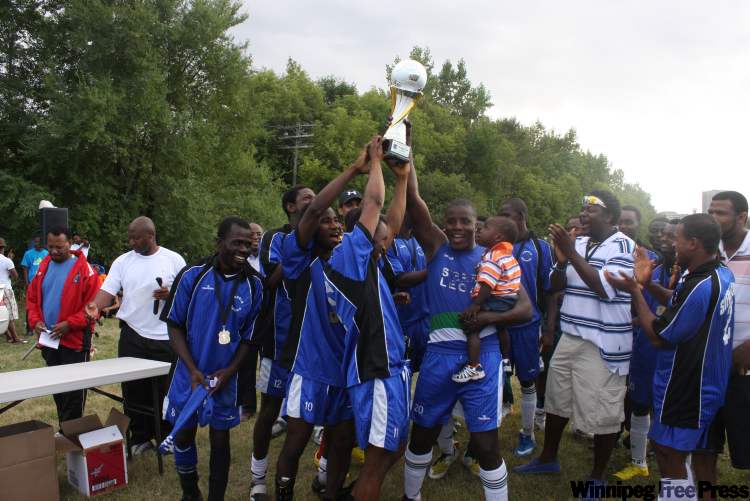Life imitates soccer
Game inspires city's African population to mix and mingle
Advertisement
Read this article for free:
or
Already have an account? Log in here »
To continue reading, please subscribe:
Monthly Digital Subscription
$0 for the first 4 weeks*
- Enjoy unlimited reading on winnipegfreepress.com
- Read the E-Edition, our digital replica newspaper
- Access News Break, our award-winning app
- Play interactive puzzles
*No charge for 4 weeks then price increases to the regular rate of $19.00 plus GST every four weeks. Offer available to new and qualified returning subscribers only. Cancel any time.
Monthly Digital Subscription
$4.75/week*
- Enjoy unlimited reading on winnipegfreepress.com
- Read the E-Edition, our digital replica newspaper
- Access News Break, our award-winning app
- Play interactive puzzles
*Billed as $19 plus GST every four weeks. Cancel any time.
To continue reading, please subscribe:
Add Free Press access to your Brandon Sun subscription for only an additional
$1 for the first 4 weeks*
*Your next subscription payment will increase by $1.00 and you will be charged $16.99 plus GST for four weeks. After four weeks, your payment will increase to $23.99 plus GST every four weeks.
Read unlimited articles for free today:
or
Already have an account? Log in here »
Hey there, time traveller!
This article was published 18/01/2012 (5038 days ago), so information in it may no longer be current.
African communities in Winnipeg are using the power and popularity of soccer to build relationships and provide opportunities to immigrant youth.
Each summer since 2003 the city’s African population, which is made up of various and often disparate cultures representing the entire continent, has come together to contest the African Cup of Manitoba soccer tournament, played from June to September at Whittier Park in St. Boniface. Nine nations were represented by a pseudo-national team at the 2011 event where the Sierra Stars — representing Sierra Leone — won the championship by beating Kenya 2-0 in the final.
But while the level of play is almost as good as it gets in this province (many of the players compete in Manitoba’s Premier division; some even played for professional clubs before coming to Canada), the games themselves are of secondary importance. As Désiré Kommongné says, soccer is “a vehicle to get young people connected to positive outcomes in their lives.”

Kommongné, involved with the African Cup of Manitoba since its inception, operates as the public relations officer for the event and oversees an organization that is as slick as it gets in local amateur sports. The competition’s website, www.africancup.ca, is up-to-date and easy to use, and some of the participating teams, such as Kenya, use brand new national team uniforms shipped directly from Africa.
Murtaza Zavery is manager of the Kenyan side and credits the Kenyan Association of Manitoba with playing a large role in the team’s organization. The Association, he says, was part of the team’s makeup from day one, when it helped a group of University of Manitoba students launch the team in 2003. But once again, he’s quick to point out, the actual soccer was merely the connecting point between the Kenyan students and those from other parts of Africa. Soccer, Zavery says, is a gathering tool that brings the city’s African communities together.
“We never come together,” he says. “Every group is doing their own thing. When it comes to soccer, that’s when we meet people from other communities. We get to know each other.”
Abey Solomon insists the African Cup is a useful social instrument that keeps young immigrants from, as he says, “doing things they’re not supposed to do.” He cites examples of players he has worked with as part of his Ethiopian team who now play at the university or even semi-professional level. Soccer, he says, is something that can help young people realize their potential, even outside the sport.
Kommongné speaks to this as well. While providing the physical activity the players need to stay healthy and fit, the African Cup also puts participants in contact with “caring coaches who are committed to helping them develop both the soccer skills and life skills they will need in life in general.”
Soccer is a useful tool for personal development, he says, and is not only a benefit to physical health but also to social integration and education.
“We constantly promote soccer in Manitoba in the light of its unifying, educational, cultural and humanitarian values,” he says. “Soccer development means investing in people and society at large. Soccer is a school of life.”
jerradpeters@gmail.com
Our newsroom depends on a growing audience of readers to power our journalism. If you are not a paid reader, please consider becoming a subscriber.
Our newsroom depends on its audience of readers to power our journalism. Thank you for your support.
History
Updated on Wednesday, January 18, 2012 9:53 AM CST: Adds colour photo



